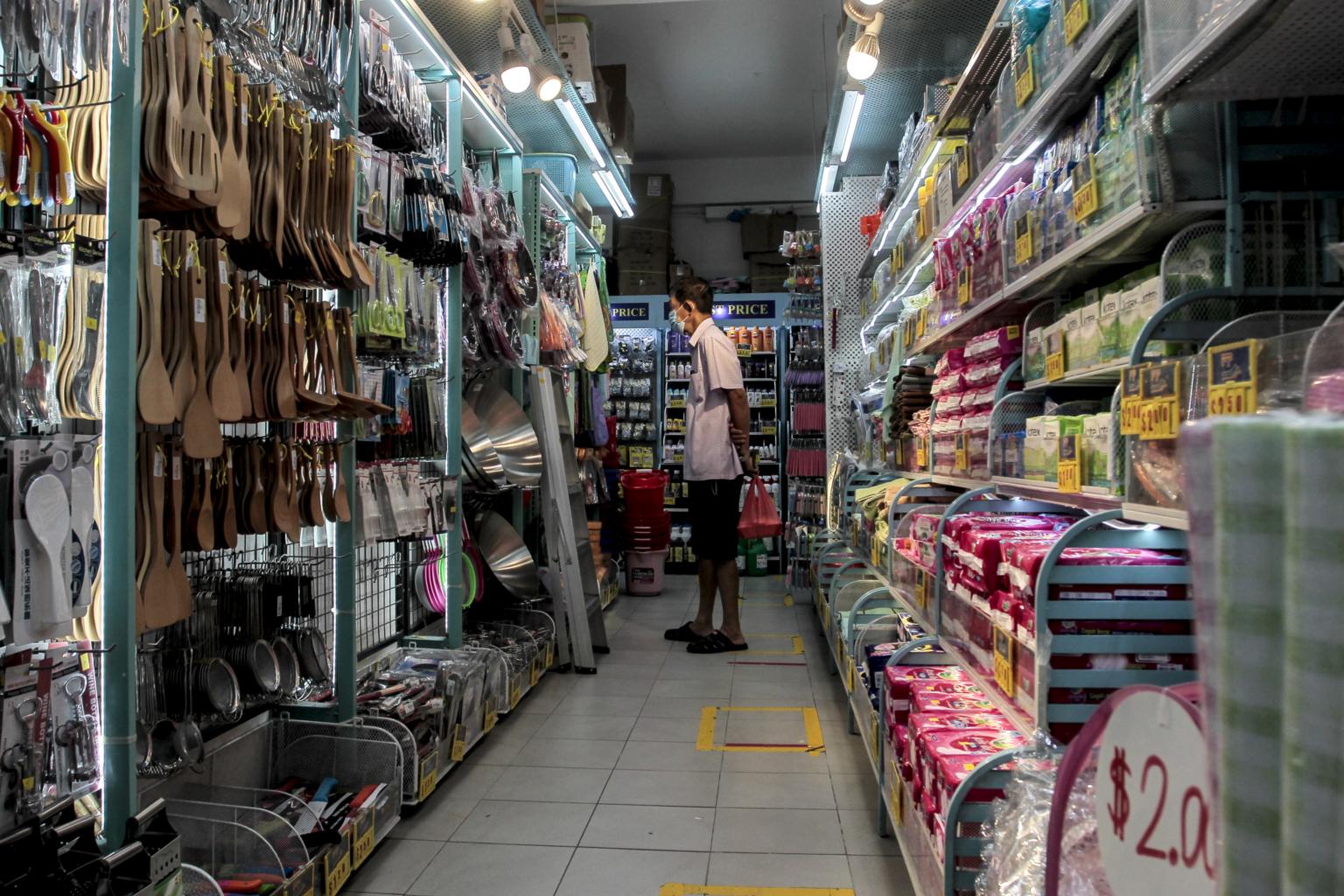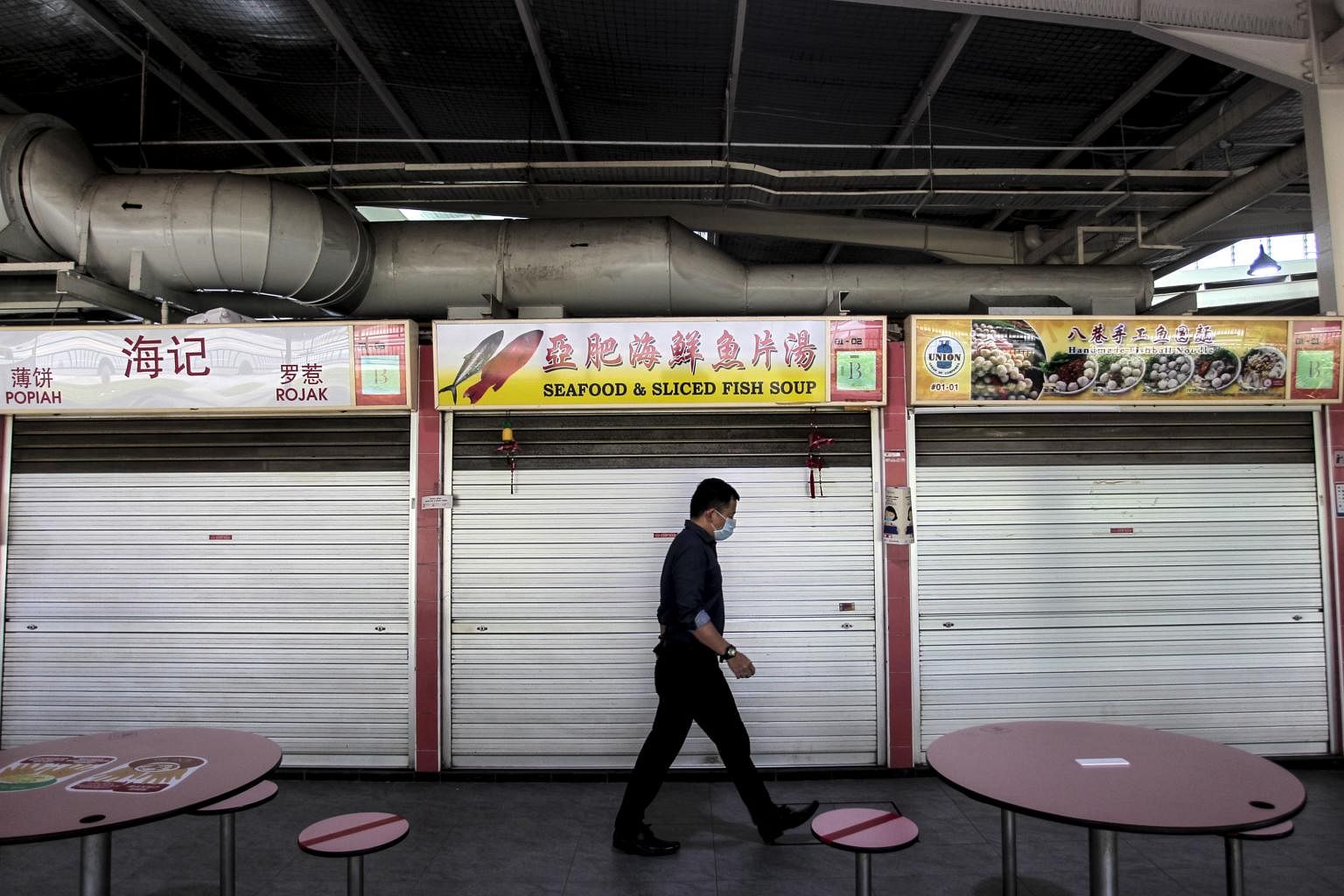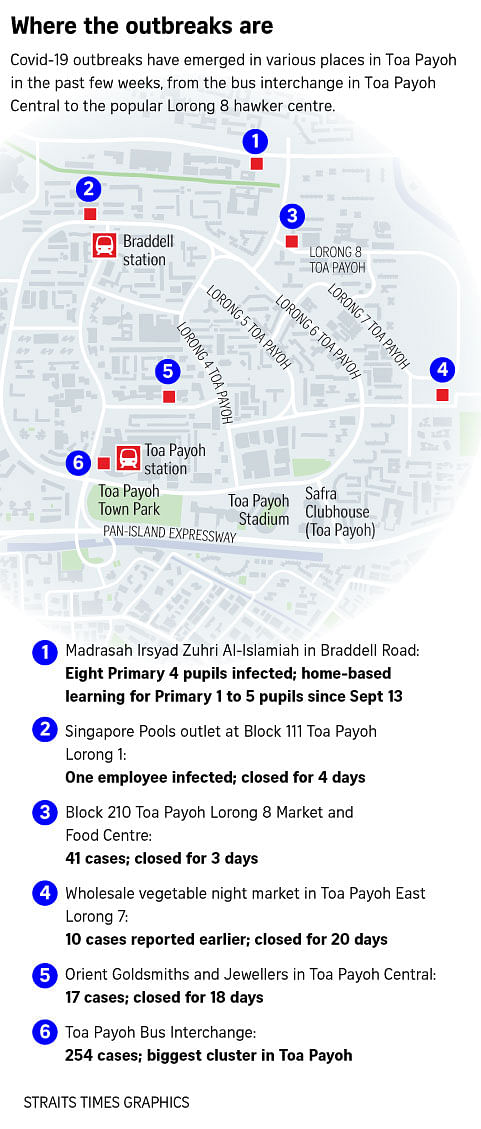Concern, frustration as Covid-19 clusters disrupt life around Toa Payoh
Sign up now: Get ST's newsletters delivered to your inbox

Businesses around the market were similarly affected by the news of the cluster and the weekend's closure.
ST PHOTO: WALLACE WOON
SINGAPORE - The crowds are gone in Toa Payoh, which is feeling the impact of several Covid-19 clusters emerging across the neighbourhood over the past few weeks.
The Ministry of Health has identified various locations with Covid-19 cases, with the biggest of the clusters - 254 cases - at the bus interchange in Toa Payoh Central.
The other clusters are the market and hawker centre at Block 210 Toa Payoh Lorong 8, the wholesale night vegetable market in Toa Payoh East Lorong 7, religious school Madrasah Irsyad Zuhri Al-Islamiah in Toa Payoh North, and Orient Goldsmiths and Jewellers in Toa Payoh Central.
The other clusters are the market and hawker centre at Block 210 Toa Payoh Lorong 8, the wholesale night vegetable market in Toa Payoh East Lorong 7, religious school Madrasah Irsyad Zuhri Al-Islamiah in Toa Payoh North, and Orient Goldsmiths and Jewellers in Toa Payoh Central.
The usually busy hawker centre along Toa Payoh Lorong 8 was mostly empty when The Straits Times visited on Monday afternoon. Less than a quarter of the 80 stores were in operation, with many hawkers having opted against opening on the first day since the premises had been closed for cleaning for three days.
The cleaning, initially scheduled for Friday (Sept 24), was brought forward to last Sunday after Covid-19 cases were detected among stallholders and workers there.
A total of 41 cases linked to the hawker centre and market have been identified.
A female hawker, who declined to be identified, said that many of the other store owners were reluctant to resume business as they were not expecting many customers to visit. She said she had opted to open as she still had to pay for rental costs.
"Today is a really horrible day, there's no one here. During lunch time, it's normally busy but as you can see, it's empty now," she said, pointing to rows of unoccupied tables. Another hawker said he would usually sell 50 bowls of fishball noodles but had less than half his takings on that day.
Member of Parliament Saktiandi Supaat, who oversees the area containing both the market and hawker centre in Lorong 8 and the wholesale night vegetable market in Toa Payoh East Lorong 7, has advised residents to avoid crowds and when necessary, to make their visits brief.
"We're also encouraging our residents to perform home tests on themselves using the ART (antigen rapid test) kits," he added.
Businesses around the market were similarly affected by the news of the cluster and the weekend's closure. A supervisor at the Kelly Jie seafood restaurant, Mr Jason, 60, said that it was slim pickings for the eatery as well.
Speaking in Mandarin, he said: "We've had no customers today, just a couple of people who came by to take away their lunch. On weekends, we usually take only reservations but less than half the tables were occupied - residents staying nearby who could not go to the hawker centre as it was closed."
Over at the bus interchange in Toa Payoh central, the usual lunchtime crowd was absent. Popular food and beverage outlets, such as Toast Box, Burger King, and McDonald's, had about half their usual number of customers.
A service staff at the Toast Box outlet, Mr Ng Yong Sun, 69, said that news of the cluster at the interchange resulted in a massive drop in the number of customers.
"On Fridays and weekends, business is generally better, but it still won't be full like it was before the cluster," he said.
Ms Easwar Utamrao Soorin, 29, a sales assistant at the Fashion One clothing shop, reported a similar scenario. She said: "At 9am when I opened the shop, there was no one at all. Some people came only after lunch."
The cluster was first reported on Aug 26 when proactive testing by the respective public transport operators picked up 36 cases linked to various bus interchanges.

A stall worker sits at a table in the market and hawker centre at Block 210 Toa Payoh Lorong 8, on Sept 20.
ST PHOTO: WALLACE WOON
According to Transport Minister S. Iswaran, less than 10 per cent of the 9,500 public bus drivers are affected by the outbreak at the interchanges.
Even though he noted that the impact on bus services had been limited, the lack of manpower has seen commuters facing longer wait times for bus services.
"I usually wait 10 minutes for the bus, but now it has doubled to 20 minutes," said Mr Soh Hun Seng, 68.
"I try to stay home as much as possible, but today I went out to meet my friend for lunch as I felt cooped up at home."
Housewife Sariyah Nacknay, 43, who was on the way home from school with her daughter, who is in Primary 3, said there was a five-minute longer wait time for the bus.
Taking it in her stride, she said: "It doesn't matter to me because I don't like to rush anyway. I can see the bus uncles are making an effort to go to work, drive us around, so I appreciate that."

A man walks past shuttered food stalls in the market and hawker centre at Block 210 Toa Payoh Lorong 8, on Sept 20.
ST PHOTO: WALLACE WOON
The Orient Goldsmith and Jewellery was first designated a cluster on Sept 4, and grew to a total of 17 cases linked to the location. The store reopened on Tuesday, having been closed for deep cleaning since Sept 3.
Neighbouring shops along the stretch reported a similar downturn in their business. Many shopkeepers could be seen sitting in their stores, customers nowhere to be found.
A few units down at Newhouse Furnishing, store owner Johnny Chan, 60, said that the dwindling footfall could sound the death knell for his business.
"My business is dying. Our business has dropped by 60 per cent - I don't have enough to pay rent. In fact, business has been dropping since around May or June.
"By the end of the year, if business doesn't improve, we can't hang on any longer and I'll have to close down my shop. I can't even say I'm sad because the Government has done what it can, and other businesses like the travel agencies and karaoke places have it worse than me," he added.
For some residents, the emergence of the clusters comes as no surprise.
"The people here don't care about Covid-19, especially the old people. They just sit around and mingle, they drink and chit-chat," said Mr Stanley Quek, 68, a transport driver for foreign workers.
Echoing his sentiments was Madam Ho, 60, who works in a bakery next to the closed Singapore Pools outlet at Block 111 in Toa Payoh Lorong 1.

An elderly man reads a closure notice of the Singapore Pools outlet at Block 111 Toa Payoh Lorong 1, on Sept 20.
ST PHOTO: WALLACE WOON
The betting outlet was closed after an employee there tested positive for Covid-19 last Friday.
Members of the public could be seen closely reading a notice on the shutter informing them of the closure, advising them to patronise alternative outlets in the area.
Madam Ho said: "The queue next door (at the Singapore Pools) has no safe distancing enforced and people don't wear their masks properly all the time." She felt another circuit breaker may be the way to go if the cases do not abate in the next few days.
Construction supervisor Kelvin Yeo, 62, said that the pandemic has just become a "part of life".
"The Covid-19 situation didn't really affect my daily life because I never liked to go to crowded places to begin with," he said.
"There are new clusters everyday and we cannot keep living in fear. We cannot cover all the bases completely to prevent the cases from happening or rising."



